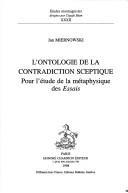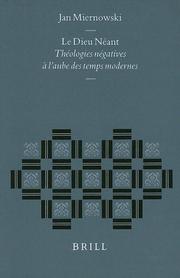| Listing 1 - 10 of 19 | << page >> |
Sort by
|
Book
ISBN: 2600002162 9782600002165 Year: 1997 Volume: 312 Publisher: Genève Droz
Abstract | Keywords | Export | Availability | Bookmark
 Loading...
Loading...Choose an application
- Reference Manager
- EndNote
- RefWorks (Direct export to RefWorks)
French literature --- anno 1500-1599 --- Dieu dans la littérature --- God in de literatuur --- God in literature --- French poetry --- God --- God in literature. --- Hermeneutics. --- History and criticism. --- Name. --- -God --- -God in literature --- Hermeneutics --- Interpretation, Methodology of --- Criticism --- Metaphysics --- Misotheism --- Monotheism --- Religion --- Theism --- History and criticism --- Name --- Bible --- In literature. --- Biblia --- 16th century --- French poetry - 16th century - History and criticism. --- God - Name. --- DIEUX (NOMS DE) --- LITTERATURE FRANCAISE DE LA RENAISSANCE

ISBN: 2852038331 Year: 1998 Publisher: Paris Champion
Abstract | Keywords | Export | Availability | Bookmark
 Loading...
Loading...Choose an application
- Reference Manager
- EndNote
- RefWorks (Direct export to RefWorks)
Montaigne, de, Michel --- Montaigne, Michel de --- Philosophie.
Book
ISSN: 00732397 ISBN: 9782600017633 2600017631 Year: 2014 Volume: 473 Publisher: Genève Droz
Abstract | Keywords | Export | Availability | Bookmark
 Loading...
Loading...Choose an application
- Reference Manager
- EndNote
- RefWorks (Direct export to RefWorks)
Une évocation de la haine comme principe esthétique sensible dans la création littéraire. L'auteur aborde notamment la poésie de la Renaissance, les pamphlets des guerres de Religion, le tragique chez Corneille et Racine, la conscience littéraire chez Rousseau, la perversion chez Céline ou encore le roman contemporain.
Comparative literature --- Thematology --- Literature --- Hate in literature --- Littérature --- Haine dans la littérature --- Aesthetics --- Themes, motives --- Esthétique --- Thèmes, motifs --- French literature --- History and criticism --- Littérature --- Haine dans la littérature --- Esthétique --- Thèmes, motifs --- Themes, motives. --- French literature - History and criticism

ISBN: 9004109153 9004474919 9789004109155 9789004474918 Year: 1998 Volume: 82 Publisher: Leiden Brill
Abstract | Keywords | Export | Availability | Bookmark
 Loading...
Loading...Choose an application
- Reference Manager
- EndNote
- RefWorks (Direct export to RefWorks)
Le Dieu Néant. Théologies Négatives à l'Aube des Temps Modernes is a study of the diverse intellectual possibilities presented to Medieval and Renaissance intellectuals by the negative theology of pseudo-Dionysius the Areopagite. It deals specifically with the ontological, epistemological and semiotic aspects of interpretations of Dionysian philosophy developed by such thinkers as Thomas Aquinas, Ficino, Cusanus and Bovelles. It also attempts to differentiate between the negative theology specific to Dionysius, and those elements of negative thinking peculiar to Hermetism and the Christian Cabala. This analysis of negative theology sheds new light on the differences between major intellectual currents of European philosophy (scholasticism, Italian Neoplatonism, German and French mysticism, occultism), while introducing useful distinctions into the history of the Dionysian tradition itself.
Negative theology --- God --- Christianity --- History of doctrines --- Pseudo-Dionysius --- -Negative theology --- -141.4 --- Apophatic theology --- Via negativa (Theology) --- Theology --- Mysticism --- Metaphysics --- Misotheism --- Monotheism --- Religion --- Theism --- -History of doctrines --- Stelsels met betrekking tot het standpunt van het godsprobleem --- Pseudo-Dionysius the Areopagite --- 141.4 Stelsels met betrekking tot het standpunt van het godsprobleem --- God (Christianity) --- 141.4 --- Christianity&delete& --- Pseudo-Dionysius, --- Via negativa (Christian theology) --- Negative theology - Christianity - History of doctrines --- God - History of doctrines
Book
ISBN: 9782600017848 2600017844 Year: 2014 Volume: 478 Publisher: Genève : Librairie Droz,
Abstract | Keywords | Export | Availability | Bookmark
 Loading...
Loading...Choose an application
- Reference Manager
- EndNote
- RefWorks (Direct export to RefWorks)
Grotesque in literature. --- Aesthetics in literature. --- French literature --- History and criticism.
Book
ISBN: 3319322753 3319322761 Year: 2016 Publisher: Cham : Springer International Publishing : Imprint: Palgrave Macmillan,
Abstract | Keywords | Export | Availability | Bookmark
 Loading...
Loading...Choose an application
- Reference Manager
- EndNote
- RefWorks (Direct export to RefWorks)
This book employs perspectives from continental philosophy, intellectual history, and literary and cultural studies to breach the divide between early modernist and modernist thinkers. It turns to early modern humanism in order to challenge late 20th-century thought and present-day posthumanism. This book addresses contemporary concerns such as the moral responsibility of the artist, the place of religious beliefs in our secular societies, legal rights extended to nonhuman species, the sense of ‘normality’ applied to the human body, the politics of migration, individual political freedom and international terrorism. It demonstrates how early modern humanism can bring new perspectives to postmodern antihumanism and even invite us to envision a humanism of the future. .
Philosophy. --- Ethics. --- Moral Philosophy. --- Humanism. --- Philosophy --- Classical education --- Classical philology --- Philosophical anthropology --- Renaissance --- Deontology --- Ethics, Primitive --- Ethology --- Moral philosophy --- Morality --- Morals --- Philosophy, Moral --- Science, Moral --- Values
Book
Year: 1992 Publisher: Genève: Droz,
Abstract | Keywords | Export | Availability | Bookmark
 Loading...
Loading...Choose an application
- Reference Manager
- EndNote
- RefWorks (Direct export to RefWorks)
Book
ISBN: 2406132617 2406132617 9782406132615 9782406132615 Year: 2022 Publisher: Paris: Classiques Garnier,
Abstract | Keywords | Export | Availability | Bookmark
 Loading...
Loading...Choose an application
- Reference Manager
- EndNote
- RefWorks (Direct export to RefWorks)
L’analyse de la métaphysique des Essais révèle une conception de l'être fondamentalement négative. Si la plénitude de l’écriture ne réussit pas à compenser le doute montaignien, le discours parvient néanmoins à sonder lucidement le vide de l’être, dans un défi intellectuel toujours renouvelé
Book
Year: 1992 Publisher: Genève : Droz,
Abstract | Keywords | Export | Availability | Bookmark
 Loading...
Loading...Choose an application
- Reference Manager
- EndNote
- RefWorks (Direct export to RefWorks)
Creation in literature. --- Humanists --- Du Bartas, Guillaume de Salluste, --- France --- Intellectual life
Digital
ISBN: 9783319322766 Year: 2016 Publisher: Cham Springer International Publishing :Imprint: Palgrave Macmillan
Abstract | Keywords | Export | Availability | Bookmark
 Loading...
Loading...Choose an application
- Reference Manager
- EndNote
- RefWorks (Direct export to RefWorks)
This book employs perspectives from continental philosophy, intellectual history, and literary and cultural studies to breach the divide between early modernist and modernist thinkers. It turns to early modern humanism in order to challenge late 20th-century thought and present-day posthumanism. This book addresses contemporary concerns such as the moral responsibility of the artist, the place of religious beliefs in our secular societies, legal rights extended to nonhuman species, the sense of ‘normality’ applied to the human body, the politics of migration, individual political freedom and international terrorism. It demonstrates how early modern humanism can bring new perspectives to postmodern antihumanism and even invite us to envision a humanism of the future. .
Philosophy --- General ethics --- ethiek --- filosofie
| Listing 1 - 10 of 19 | << page >> |
Sort by
|

 Search
Search Feedback
Feedback About UniCat
About UniCat  Help
Help News
News